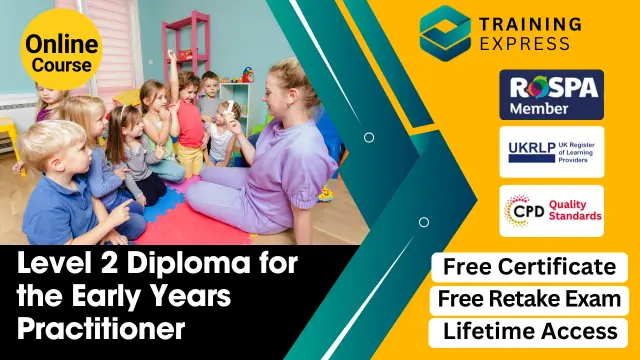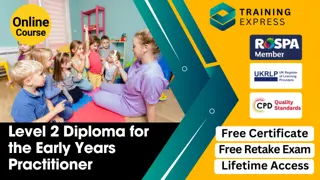
Level 2 Diploma for the Early Years Practitioner
CPD Accredited | Free PDF & HARDCOPY Certificate included | Free Retake Exam | Lifetime Access
Training Express Ltd
Summary
- Hard copy certificate - Free
- PDF Certificate - Free
- Exam(s) / assessment(s) is included in price
- Tutor is available to students
Add to basket or enquire
Overview
Are you interested in specialising in the social and academic growth of infants and young children as an early year practitioner? Then you should take this course. You can learn the teaching skills necessary to become an early years practitioner and grow in this sector by doing this Level 2 Diploma for the Early Years Practitioner course. Enrol right away if you want to take advantage of this chance to increase your understanding about early-year practitioners.
This Level 2 Diploma for the Early Years Practitioner course is developed by industry experts and intended to give learners a thorough understanding of the important aspects of learning and development as well as how to offer better results for all children. With the course for Level 2 Diploma for the Early Years Practitioner , you will gain access to a carefully prepared curriculum and be able to boost your early years practitioner career. You will also acquire theoretical knowledge of the teacher's role and the necessity of early years education for development. It covers teaching approaches, safety requirements, and educational philosophies. Additionally, you will study the SEN teacher's duties and guiding ideas.
It is ideal for learners who intend to get into the workforce and is connected to a wide range of job roles in early childhood settings. With the completion of this course, along with additional education and training, you may be able to acquire a variety of abilities that will make you stand out to potential employers and pursue any early childhood practitioner career, such as nursery practitioners, childminders, teaching assistants, and so on, and earn a decent salary.
Learning outcome:
After completing this Level 2 Diploma for the Early Years Practitioner course, you will:
- Understand the Early Years Practitioner's duties and responsibilities.
- Identify the various categories of special educational needs and each of their traits.
- Deliver better results for all children in terms of their learning and development in the early years.
- Contribute to reducing the academic achievement gap between poor kids and others.
- Explain in depth the significance of early education for development.
- Employ a variety of teaching methods while creating and supporting a learning environment.
- Keep children inspired and evaluate their unique learning objectives.
- Ensure the welfare of children, promote it, and foster good working relationships with them.
Key Features:
- Accredited, quality CPD training
- Instant e-certificate and hard copy included
- Fully online, interactive course with audio voiceover
- Course material developed by qualified professionals
- Self-paced learning accessible via laptop, tablet, and smartphone
CPD
Course media
Description
Throughout the Level 2 Diploma for the Early Years Practitioner course, you will also develop the essential skills needed to form positive relationships with pupils and family, learn how to communicate effectively, and motivate children to reach their Early Years learning goals.
On successful completion of the course, you will be able to use this training to get boosted your career and gain a range of skills to stand out to prospective employers.
Details Curriculum of Early Years Course
Module 01: Introduction to EYFS
In module one, we will explore the key principles underpinning EYFS, and how EYFS is used to close the achievement gap between disadvantaged children and others.
Module 02: Importance of Early Years in Development
In module two, we will learn about the benefits of early years education in childhood development and explore progression through the areas of learning and development.
Module 03: EYFS Teaching Techniques
In module three, we will familiarise with a range of EYFS teaching techniques and methodologies, and learn about the importance of creating an enabling learning environment.
Module 04: Working as an EYFS Teacher
In module four, we will develop our understanding of the role, responsibilities and skills of any EYFS Teacher, as well as the career path, requirements and qualifications needed to teach in early years education.
Module 05: Promoting Learning and Development
In module five, we will explore the key areas of learning and development, including personal, social, and emotional development. It also provides essential information on communication, language and literacy development.
Module 06: Children Having Special Education Needs or Disabilities
In module six, we will explore the role of the Early Years Special Education Needs Coordinator and how to use the Graduated Approach to SEN/SEND in Early Years education.
Module 07: Parents’ Guide to the Early Years Foundation Stage
In module seven, we will learn about the parent’s role in early years development, taking a look at the different ways to support and nurture children, and what EYFS means for a parent.
Module 08: Welfare Requirements
In module eight, we will broaden our understanding of safeguarding policies and procedures in a school setting, with step-by-step training on how to provide paediatric first aid. It also discusses records and documentation.
Module 09: The EYFS Educational Philosophies and Privileges
In module nine, we will learn about Montessori Education and its Relation to the EYFS. It covers Montessori Practice and The Early Year Foundation Stage, as well as the benefits and challenges of the Montessori Approach.
Module 10: Registration, Inspection, and Quality Improvement
In module ten, we will gain an in-depth understanding of the role of the local authority, covering key topics such as inspection, quality improvement and enforcement.
Module 11: EYFS Framework in 2021
In this final module, we will gain up-to-date information on the EYFS framework for 2021, exploring the new changes. It covers the EYFS profile, purpose and principles, and early learning goal assessment.
Assessment
At the end of the course, there will be an online assessment, which you will need to pass to complete the course.
Certification
Once you’ve successfully completed your course, you will immediately be sent a digital certificate. Also, you can have your printed certificate delivered by post (shipping cost £3.99).
Who is this course for?
This Level 2 Diploma for the Early Years Practitioner course is suitable for anyone who is interested in working with children or contributing to their development. Anyone who works with or educates young children should take this course. Existing professionals who work in early childhood education, nurseries, preschools, and homeschool settings may find the information in this course useful.
Please Note: This is not a regulated course and doesn't provide professional qualifications. To get professional qualifications, you can go for:
- Level 2 Diploma for the Early Years Practitioner (RQF)
- NCFE CACHE Level 5 Diploma for the Early Years Senior Practitioner
- Level 3 Diploma in Early Years Education and Care (Early Years Educator) (VRQ)
- NCFE CACHE Level 4 Certificate for the Early Years Advanced Practitioner
- NCFE CACHE Level 2 Award in an Introduction to Neuroscience in Early Years
- NCFE CACHE Level 4 Certificate in Neuroscience in Early Years
- Level 3 Diploma for the Children's Workforce (Early Years Educator) (RQF)
- Level 3 Certificate in Preparing to Work in Early Years Education and Care (VRQ)
Career path
- Childminders - Salary: £20,000–£30,000 per annum
- Primary Teacher - Salary: £20,000 to £30,000 per annum
- Teaching Assistant - Salary: £20,390 to £22,543 per annum
- Nursery Practitioner - Salary: £21,471 to £24,603 per annum
Questions and answers
Currently there are no Q&As for this course. Be the first to ask a question.
Certificates
Hard copy certificate
Hard copy certificate - Included
You will get the hard copy certificates for Free! The delivery charge of the hard copy certificate inside the UK is £3.99 each.
PDF Certificate
Digital certificate - Included
Reviews
Legal information
This course is advertised on reed.co.uk by the Course Provider, whose terms and conditions apply. Purchases are made directly from the Course Provider, and as such, content and materials are supplied by the Course Provider directly. Reed is acting as agent and not reseller in relation to this course. Reed's only responsibility is to facilitate your payment for the course. It is your responsibility to review and agree to the Course Provider's terms and conditions and satisfy yourself as to the suitability of the course you intend to purchase. Reed will not have any responsibility for the content of the course and/or associated materials.





